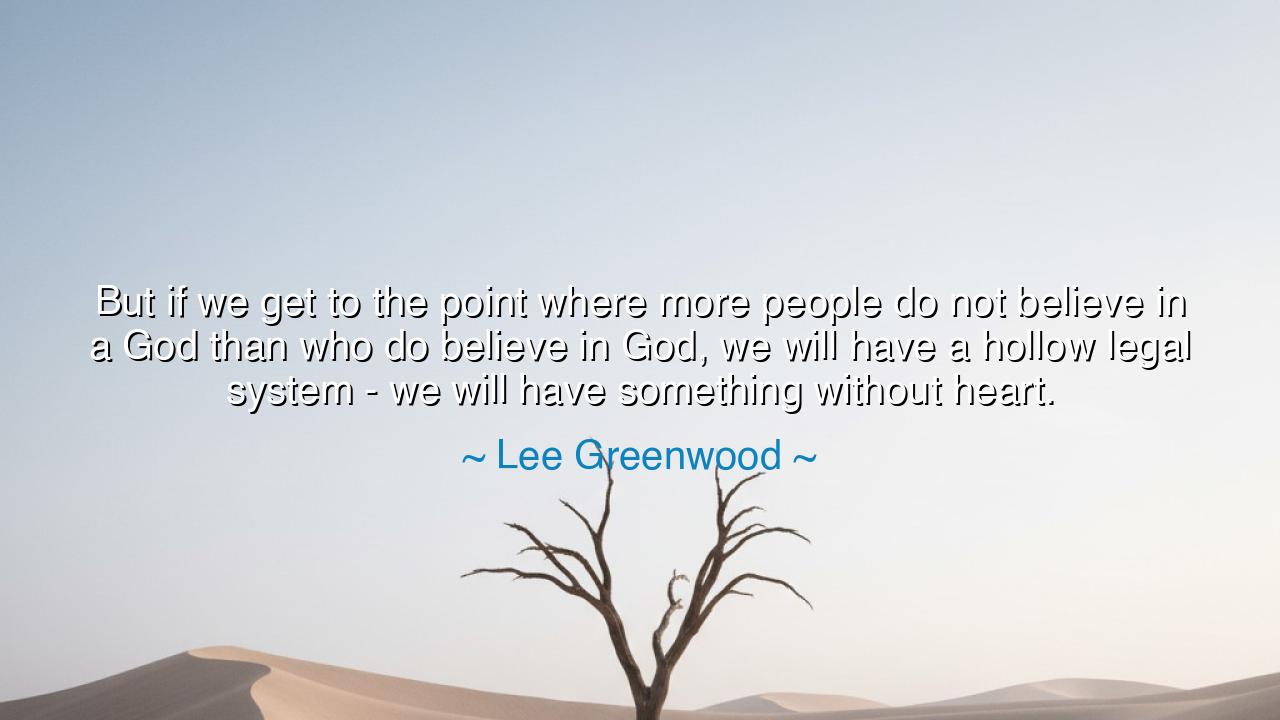
But if we get to the point where more people do not believe in a
But if we get to the point where more people do not believe in a God than who do believe in God, we will have a hollow legal system - we will have something without heart.






Hear the words of Lee Greenwood, spoken with solemn conviction and heavy forewarning: “But if we get to the point where more people do not believe in a God than who do believe in God, we will have a hollow legal system—we will have something without heart.” These words are not mere sentiment, but a cry from the depths of conscience. For Greenwood saw that laws, though carved in books and enforced by courts, are but brittle bones without the living spirit of morality to animate them.
The meaning of this quote lies in the relationship between faith and law. The law gives order, but faith—whether in God or in transcendent moral truths—breathes life into that order. Without such grounding, Greenwood warns, the legal system becomes a machine: efficient, yet devoid of compassion; strict, yet stripped of mercy. To him, belief in God is not simply a matter of private worship but the fountainhead of justice, the source of higher accountability that ensures law serves humanity, not merely power.
The origin of these words reflects a long-standing debate in American life. From the founding of the republic, leaders wrestled with the question of morality’s root: does justice rest solely upon reason, or must it be anchored in divine authority? Greenwood, like many before him, feared that a society severed from God would also sever itself from the virtues of humility, sacrifice, and love that give law its heart. His quote arises from the cultural battles of his time, when belief and unbelief contended for dominance in shaping the moral vision of the nation.
History itself gives testimony to this struggle. Consider the fall of Rome, once mighty in law and order, yet eventually hollowed by decadence and corruption. The empire had courts, codes, and armies to enforce them, yet lacked the moral compass that had once animated its republic. Without a higher sense of duty, the laws became instruments of tyranny rather than guardians of the common good. In contrast, the abolitionists of the nineteenth century, inspired by their faith in God, rose against the chains of slavery, appealing not only to statutes but to eternal justice written in the heavens. Their example shows that faith can give law both courage and compassion.
The lesson carved here is profound: a legal system alone cannot save a people. Statutes and regulations can bind the hands, but only belief—whether in God or in transcendent truths—can bind the heart. When law is severed from moral conviction, it becomes hollow, a skeleton that may stand upright but lacks the breath of life. Greenwood’s words remind us that societies are not sustained by rules alone, but by the shared values that inspire those rules to serve righteousness.
What then must we do? We must nourish not only the letter of the law but the spirit behind it. Whether through faith in God or through deep commitment to moral truth, we must cultivate humility, compassion, and justice in our own lives. Support leaders and judges who uphold the law with wisdom, not merely technical precision. Teach children that the law is more than punishment; it is a covenant between people, rooted in conscience and higher duty. In daily life, let your actions give heart to the laws you obey.
Thus, remember Lee Greenwood’s words: “Without belief in God, we will have a hollow legal system, something without heart.” Whether you hold to faith in the divine or to moral truths written in human dignity, the teaching endures: law without spirit is lifeless, order without compassion is tyranny. Pass this wisdom to future generations, that they may know justice must be guided by something higher than itself, lest the law become a cage instead of a shield. For in belief, conscience, and higher duty lies the true heart of any people’s justice.






AAdministratorAdministrator
Welcome, honored guests. Please leave a comment, we will respond soon